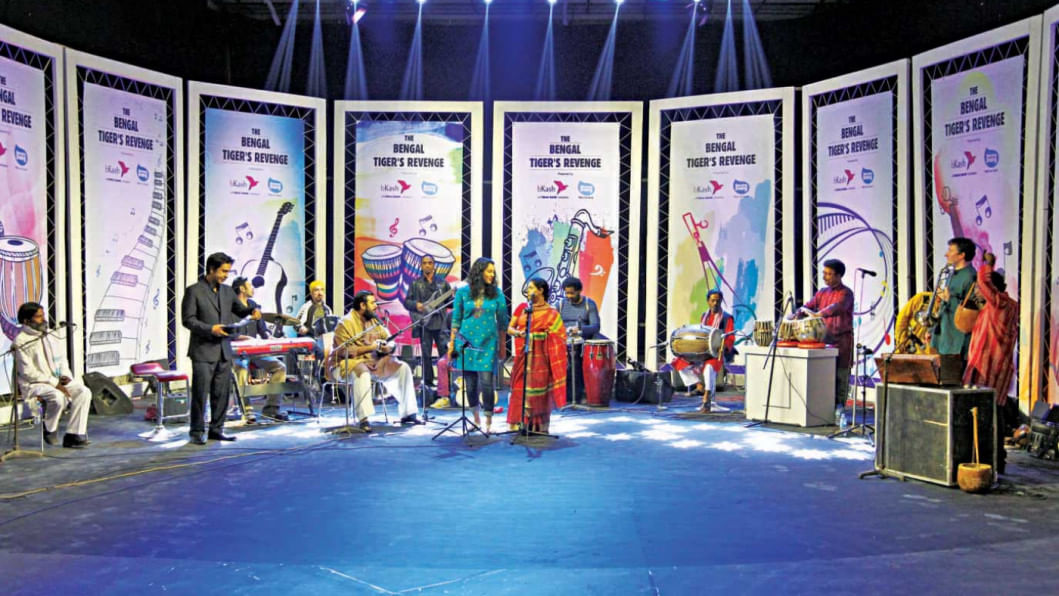Rooted in Rythm

The music of the people for the people, by the people – that's probably one way of describing folk music. Shikor, a Bangladeshi traditional folk music band, will be representing the very roots of our culture at two international music festivals to be held in the UK this summer.
It's chaos at the studio of Channel i where The Bengal Tiger's Revenge, a collaborative musical show featuring the UK based band Lokkhi Terra and the folk band of Bangladesh Shikor, is being shot. Shooting would commence any minute now and the musicians are busy checking their instruments, ensuring that their microphones work. The members of Lokkhi Terra are either lounging around on sofas outside the studio room or are busy making sure that the musical arrangement is just right for their show. Members of Shikor, on the other hand, stick to the studio room. This is one of their first television appearances as a band and they want to make sure everything is perfect.
Shikor, which literally translates to roots, is a baul or folk music band featuring traditional musicians from all around the country. Lokkhi Terra, on the other hand, is a contemporary Bangla-Afro-Latin band based in the United Kingdom. Both bands will be playing at the World of Music, Art and Dance (WOMAD) festival and the Songlines Encounter Festival in the UK this summer. Interestingly, this will be the first time that Bangladesh will be represented at WOMAD, a widely popular and acclaimed international music fest. It's only befitting that a traditional band, deep-rooted in the time-honoured musical heritage of Bangladesh, will be representing the true soul of the country to the outside world.

“We will basically represent the musical roots of Bangladesh on an international platform. Hopefully, we will be able to do justice to our traditional musical culture,” says Nazrul Islam, band leader and dhol player of Shikor.
Shikor was initiated by Kishon Khan, the founding member of Lokkhi Terra, who brought together a group of professional folk musicians who specialize in traditional folk music. “I had met Nazrul Islam around ten years ago when he played the dhol for one of our songs. That was the beginning of our collaborative music journey,” says Kishon Khan.
Nazrul Islam had also played the dhol for popular bands like Bangla and Arnob and Friends. When Kishon came up with the idea of a traditional folk band and asked Nazrul if he would be interested in forming and leading such a band, Nazrul jumped at the opportunity. “With the help of Kishon, I brought together a number of other musicians who are experts in root music but don't really get the scope or opportunity that they deserve,” says Nazrul Islam. Even though they may have the required talent, they are often relegated to the background of mainstream music performances, adds Nazrul.
Shikor does not only give such gifted artists the chance to fully explore their potential but will also provide them with the opportunity to put theirs and Bangladesh's name in the world map of music. With their solo and collaborative performances with Lokkhi Terra at the WOMAD festival, the Songlines Encounter Festival and a performance at the BBC Radio 3 in the UK, Shikor is on its way to showcasing their talents to the international world.

Kishon Khan and his band have been helping to train and prepare the band for their debut international performance. The Bengal Tiger's Revenge, sponsored by bKash and Aarong, is only a premier presentation of what's in store for audiences at the festivals abroad, he says. Lokkhi Terra, which is credited to giving a new spin to the traditional music of Bangladesh, is a multi-cultural band. Described by Songlines Encounters Festival as “one of London's best kept secrets, and probably the world's best Afrobeat-Cuban-Bangladeshi group”, the band is a wonderful example of what it means to play 'world music.'
Kishon says that as he was born in Bangladesh, he realises that his roots are in this country and thus could easily relate to the traditional music and sounds of the rural culture. “When I was around 20 or 21 years old, I travelled around Bangladesh with some Bauls. During this time, I was able to experience the amazing and rich music culture that exists in every corner of the country,” says Kishon.
While Kishon speaks a little Bangla, some of the other band members are not natives of the country and thus don't understand the language, let alone speak it. It would only be natural for non-Bangla speaking band members to find it difficult to communicate with the members of Shikor. However, Justin Thurger, the trombone player of the band, says that it wasn't as difficult because music is a universal language. “You don't really need to verbalise anything in the presence of music. Whenever we faced any communication problem, we would sit down and things would get sorted out easily once we started playing our instruments,” he adds.
Biju, the harmonium player and percussionist of Shikor, agrees, further adding, “We will be playing traditional Bangla music in front of an international audience who probably won't understand our language. But we are sure that they will understand our music and that's what will connect us.”
Labik Kamal Gaurob, who will be performing with Shikor as a vocalist at the international festivals, says that the band will primarily focus on traditional baul and bhatiyali (songs typically sung by boatmen) music at the events organised in the UK. “The Bengal Tiger's Revenge, the TV show which will be aired on Channel i, is basically an introduction to the band, informing the audience about the band's performances in the UK. As these festivals will provide us with an international platform, we are hopeful that they will open other doors and provide the traditional music of Bangladesh with the international exposure that it deserves,” says Gaurob.
Lokkhi Terra plans to record a collaborative album with Shikor in the UK after their performances at the festivals and will also record an album with Baby Dewan, the female vocalist of the band. Vocalist and baul Rob Fakir, tabla player Bappi, flutist Jalal and dotara player Mokaddas, form the rest of the traditional folk music band.
With assistance and sponsorship from Augaar, InnStar, Culturepot Global, Aarong Dairy, BKash, Ittefaq and Echo Bass Studios, who have contributed in this endeavour to support Shikor in their first international venture, the band will be performing at the Songlines Encounter Festival in June 2015 and at the WOMAD festival in UK in July 2015. If you are anywhere in the vicinity, please do attend the programme to show your support and gratitude to this small band that is making a huge effort to put Bangladesh on the world map of music.
The Bengal Tiger's Revenge will be aired today (February 6, 2015) from 10.30 am to 12.30pm on Channel i.

 For all latest news, follow The Daily Star's Google News channel.
For all latest news, follow The Daily Star's Google News channel. 



Comments